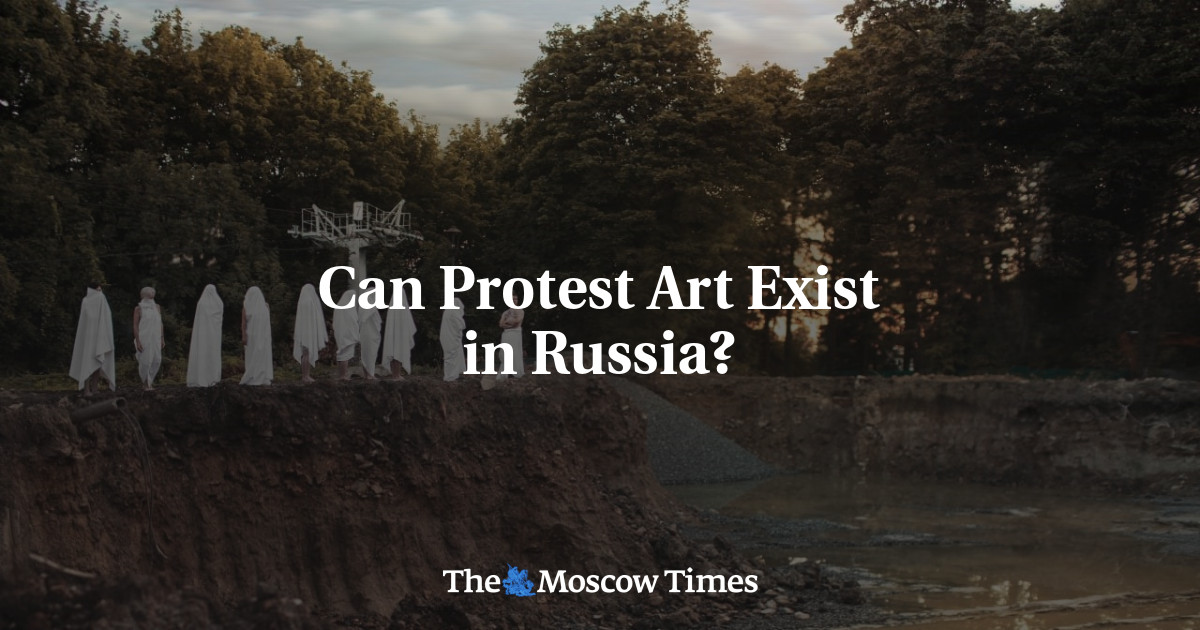
Three young women wearing the capes of superheroes, their bodies painted in the colors of the state flags of Russia, Ukraine and Belarus, make love on a white canvas that symbolizes the canvas of history. This video performance “NO” and another work were shown in August at the Climate Cultures Festival in Berlin.
The performance and video were made by Vladimir Kuznetsov, a 37-year-old former journalist and activist in Penza. From 2013 until 2020 he was a chief editor of the city magazine called TheOut, which served the half-million population of this city 625 kilometers (388 miles) southeast of Moscow.
After a divorce in 2018, Kuznetsov “reconsidered his values and decided to make changes in his life.” He began producing for YouTube, making entertaining videos, including about tolerance in general and LGBT rights in particular. His videos were mainly for teenagers and were posted on the channels Bashinsky Time and BTLite on YouTube. “The colleague I was working with lived in a small town near Penza. Of course, we were afraid, since the topic of LGBT is banned in Russia. But I have never divided people according to this kind of criteria, and I knew that this topic was important for many people,” Vladimir Kuznetsov told The Moscow Times.
Then he moved to another YouTube channel, TheOut, and changed his video performances. In one he “broke the funeral urn of his grandmother.” These were not the real ashes of his grandmother; the dust was just building material. But this funeral urn symbolized something sacred, and by smashing it Kuznetsov was conveying the message that nothing is sacred.
In another performance video, a man got seven tattoos at the same time — a YouTube record. He also interviewed elderly people and asked them about sex in the U.S.S.R. Vladimir Kuznetsov said at first it was difficult to find people to work with and interview, but now it is not a problem.
Rethinking Himself
When he could not log into his TheOut account and channel in May of this year — he doesn’t know why — he continued his work on another channel called TheOut2.0 channel. Kuznetsov wanted to talk about what concerned him with the help of art; everything that he does is about rethinking himself and life.
He conceived the performance called “NO” before the war at a time when reconciliation with Ukraine still seemed possible. He wanted to call it “No to war.” In March, the performance took on a different meaning — no to any violence. “Now I mean reconciliation within society itself, between ordinary people. Each day, with each new death, society and individuals need more and more strength for reconciliation. I understand that either a hundred years must pass for reconciliation, or everyone needs to become superheroes.”
This year his work “Dead Fish” also acquired new meaning. Kuznetsov made it in 2021 and dedicated it to Russian journalist Anna Politkovskaya, the independent journalist assassinated in her apartment house entryway. Today people cannot say publicly everything they think, since it is against the law to “discredit” the armed forces in Russia. The population is “as silent as dead fish.”
“Parade of Planets on the Edge of the Abyss” is also about freedom of speech and restrictions on this freedom. Women are a symbol of society, the sun is a symbol of power, and power does not want to talk to society.
The theme of growing up, becoming an adult, runs through all his work. Kuznetsov said that “fighting for your rights is a sign of entering adulthood.” In fact, in his view a democratic society is an adult society. “But for society as a whole to fight for its rights — that is, for society to grow up — we need a transformational change,” he said. “Today some Russians grow up instantly when there is a death of a family member. They are beginning to understand that today’s politics, today’s society and today’s leaders must be changed.”
Kuznetsov also organized and now runs a storytelling project called “1,000 Faces – 1,000 Words,” which is meant to encourage people to pay attention to the people around them. “I came to art when I realized that I didn’t want to hide behind words, because words are not enough. In these stories I try to write not only what people said, but also what they didn’t say. They are partly about me because through them I try to understand myself and my place in life.”
He is sure the war will someday pass, and people will need to heal their souls. But, he said, they can only do it through “art and unconditional love.”





